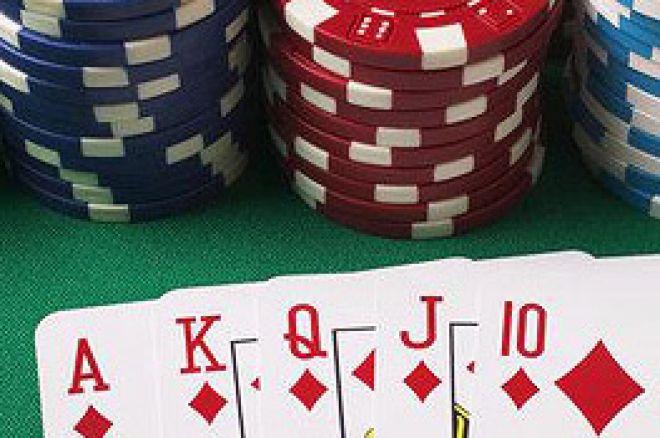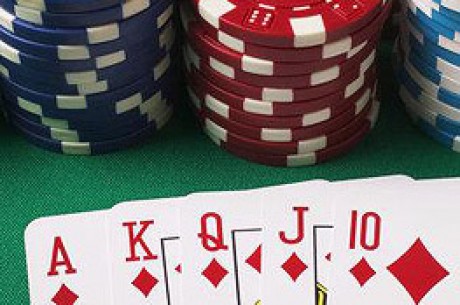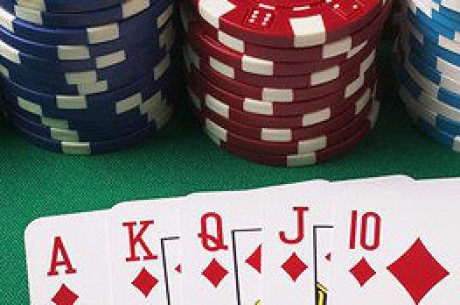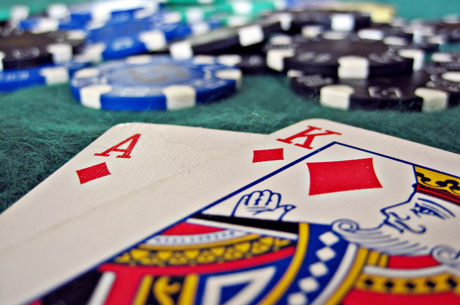Stud Poker Strategy - Deception - Bluffing, part one.

First, let's define our terms so we are all talking about the same thing. A bluff is an act of deception in poker that attempts to deceive an opponent and convince him to fold, by making an aggressive betting action, and represent that a weak hand, that would not be likely to win the hand on its intrinsic value, is in fact a very strong hand. Here's a classic example of a bluff. You're playing 5-Card Draw. You have four to a flush on the draw. Your opponent bets. You call him. He draws three cards. You draw one. You don't make your flush. He checks. You bet a lot as if made your flush.. Your opponent, believing that you made the flush, folds his hand and you win the pot. Satisfying, no?
The movies have been great in glorifying the bluff in poker. Remember Big Hand for a Little Lady, Cool Hand Luke, or House of Games? All of them make the bluff the centerpiece of the game. None of them are particular realistic.
In 2003, the poker world was catapulted onto a whole new level of popularity with the start of the first televised poker in the United States. If you thought that movies had a major impact on the public's perception of poker, then the impact of the World Poker Tour can best be described as revolutionary. Tens of millions of people have been brought to the game. And what do they see? They see the best players in the world, playing six handed no limit Texas Hold Em with huge blinds and antes. And they see these players bluffing up a storm. So what's the casual player or non-player to conclude once again? The bluff is the key to serious poker.
When I tell people that I'm a poker player, or that I'm entering a poker tournament, the first question most people ask me is, "Do you bluff much?" It's the one poker move that has fully captured the imagination of the public - and thereby, it is the one move that the casual player thinks he must master if he is to become a solid poker player.
But here's the thing about the real world of low and medium stakes Stud. For the most part, the bluff is overrated. Most of the money you win or lose in those relatively low stakes affairs will not be won or lost because of excellent bluffing techniques. Hardly any of it will be won because you have become an expert at detecting signs that your opponent is bluffing. And yet the myth of bluffing's importance to poker continues. Go figure.
All of that being said, there are opportunities to deceive your opponent in Stud. I'll cover them in future column. But for now, here's an example of what not to do.
You're playing $1-5 stud at your local poker room. The game is filled with the typical line up of very loose and passive players. You're dealt (9h 6h) 3h. You're the bring-in in a $1-5 game and bet $1.00. You get five callers. No one raises.
The next card you're dealt is the 4h. That gives you a 4-Flush. Someone with a Jack gets a King and bets $3. Three people call the bet as do you. None of you appear to improve on Fifth Street or Sixth Street. The player with the Jack King continues to lead the betting and you and the other players continue to call.
It's the River, the last round of betting, and you get an unhelpful Club. You have nothing --- a Queen high. The player with the Jack King checks as does the next player. You bet with your 4-Flush hoping to represent a Flush, get all the other players to fold and win the pot.
This move will fail. Save your money. Check and lose the pot.
Bluffs like this don't work in Stud because of the nature of the game and the betting. Unlike the games in the World Poker Tour, stud is almost always player limit (except in Europe - but that's another story). In limit poker, the size of the final bet will usually be a very, very small percentage of the final pot, especially so when there are many players still in the hand as there often are in a low stakes spread limit game like $1-5. So in the game above, with a pot of $100 or more, that final bet was only 1/20th of the pot. Compare that to a No Limit game where the bet is often the size of the pot. For $100 you might have convinced your opponents that you actually had the Flush. For $5.00 it's much more likely that one of them is going to look you up and call.
So, in general, in low stakes games with many loose players (the kind of games you want to be in), you want to focus on value bets - those bets when your hand actually figures to be the best hand that is out - with either the best chances for improving to the winning hand or, on the River, with the best chances for being the best hand in a showdown.
In the next columns I'll start explore the eight factors you should consider when deciding whether or not to bluff in stud.
Ed Note: There is usually a lot of Stud action at Pacific Poker








